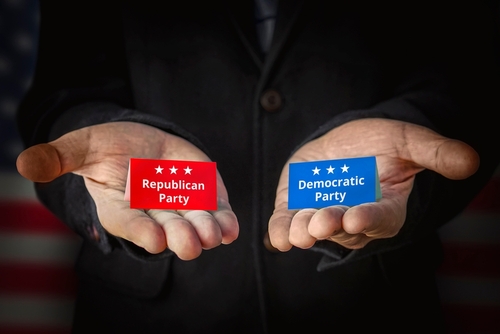
The year 2024 may seem far away, but the future of our democracy is already being discussed. It all started with a groundbreaking proposal from six states that could potentially reshape the way we vote. With the increasing debate around election security and fairness, these states are taking a bold step towards creating a more efficient and transparent electoral process.
The proposal, which has gained significant traction in recent weeks, suggests a change in the current winner-takes-all system to a district-based allocation of electoral votes. This means that instead of the traditional "all or nothing" approach, each state would allocate its electoral votes based on the results in individual congressional districts. This idea has sparked intense discussions among politicians, experts, and citizens alike.
Just 6% of voters in just six states will likely decide this year's election.
Every American deserves an equal voice and equal say in our democracy, no matter where they live.
This is why we need the National Popular Vote Interstate Compact. https://t.co/8n3UXQPTr6 pic.twitter.com/VS60O8Vl7J
— Stand Up America (@StandUpAmerica) May 6, 2024
While some argue that this proposal could bring more accuracy and representation to the electoral process, others are concerned about the potential implications it could have on the overall election results. Proponents of the change argue that this system would better reflect the will of the people, as it would take into account the diverse political views within each state. However, critics are worried that this could lead to a disproportionate distribution of electoral votes and potentially favor one party over the other.
So, what are the chances of this proposal actually becoming a reality? Well, it may be too early to tell, but the support for this idea is steadily growing. In fact, several prominent politicians have already expressed their support for this change, including Senator Elizabeth Warren and former presidential candidate Pete Buttigieg. This could be a sign that a shift in the electoral system is not too far-fetched of an idea.
LEFT: Maxine Waters says she wants the DOJ to investigate Trump supporters for potential violence if he loses the election in 2024.
RIGHT: Hillary Clinton supporters go on violent rampage in Washington DC because she lost the election in 2016. pic.twitter.com/6OhWudtQ7x
— Western Lensman (@WesternLensman) May 6, 2024
Of course, there are still many challenges and obstacles that would need to be addressed before this proposal could be implemented. For instance, redistricting would need to be taken into account, as well as the potential impact on smaller states with only a few congressional districts. Additionally, it is important to consider the potential legal challenges that could arise from this change.
The possibility of a district-based allocation of electoral votes has also sparked discussions about the need for a broader reform of the entire election system. Some experts argue that it is time to reevaluate the electoral college as a whole and consider alternative options that could better represent the will of the people. This proposal could serve as a starting point for a larger conversation about the future of our democracy.
Despite the various opinions and challenges surrounding this proposal, one thing is for sure – it has opened the door for a much-needed dialogue about our electoral process. Whether or not this idea gains enough support to become a reality in 2024, it has shed light on the need for continuous improvement and adaptation in our democratic system. As we move towards the future, it is crucial that we carefully consider all potential changes and their impact on our democracy.
What are YOUR thoughts?
We want to hear from you! Please comment below to join the discussion.













NO NO NO
taking away the citizens right to vote
and if so let those 6 states pay the taxes for the salaries of the government
sometimes your bright ideas are not bright
this is turning into a DICATORSHIP
and NOT A FREE COUNTRY
Ahhh, no, I’m NOT on board with this change. Our Founding Fathers made the Electoral College for a reason. No one or two States should decide the outcome of the Election. Our Election process has worked fine for 200+ years, we do NOT need to fix something that is NOT broken. Our Country faces so many issues that need addressing, leave the Electoral College alone. Instead let’s address the need for voter ID, more stringent rules for those that insist on Mail in ballots. Our Voting Machines need addressing to ensure NO remote interference or rigging of the tabulations. These machines should be “American Made”, with American made components.
It’s going to become disproportional in some states therefore illegal there’s no way to even out all the states at this time
I once read a comment about retaining the electoral college, but not all the votes assigned to the whole state but divided by the counties of that state. So, upstate New York, for example, would have as much of a say as metro NYC in determining the outcome. There are a little over 3000 counties in the whole country and if each county was given one electoral vote, no matter how densely populated it is, each county would have a voice and not only the concentrated urban centers. To win the election, a presidential candidate would need half of the county votes plus one.
Well in 16, Trump would have won most of the delegates. He won won over 79% of all counties on the east and west of the mountain, while she the blob on the coast!
Why would natural born Americans keep changing our laws and our way of life .so far, none (politicians) or government have been able to change to their way of thinking. Thank God. What makes their way better than our signed Constitution?